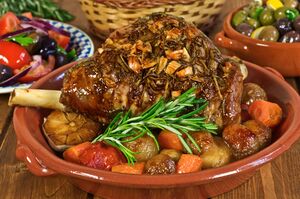Syaran cuisine
Syaran cuisine is the cuisine of Syara and Syaran people across Tyran. Syaran food is founded on what is commonly known as the "four pillars"; wheat, olives, wine, and goat, which have long served as the staple of the Syaran diet. Syaran food has been influenced heavily by its historical neighbors, including Ruvelka and Mansuriyyah, while Syara's location along the Sundering Sea has allowed for the distribution of spices and foreign meals as well.
Many Syaran dishes can be traced back through history to antiquity. Olive oil is especially prominent and mentions of it are frequently found in records of the Kydonian League. The Makedonian Empire's conquest of much of Siduri brought Syaran into contact with foods from far flung regions including Quenmin, Tennai, Knichus and Cacerta. The influx of new kinds of meats, plants, spices, and dishes resulted in a wide variety of offerings and choices for the Syaran elite. Following the Fall of the Makedonian Empire Syaran cuisine pivoted away from exotic and foreign tastes towards more homegrown varieties, but remained heavily influenced by Ruvelkan, Masnuri, and Dragovitan styles.
Olive oil is the primary component of most Syaran dishes, owing to prominence of olive trees along Syara's extensive coastline. The extreme fertility of the Galanian valley has also lead to the prominence of grains, especially wheat and barley, which is often baked into breads. Grapes are also widely produced and contribute to a strong purveyance of wine throughout Syaran meals. Yoghurt was introduced by the Erani and remains a popular side dish.
Cattle are relatively uncommon in Syara, so most meat is provided by other animals; goat meat, mutton, pork, and poultry are the most common meats. Fish is also widely consumed, especially in coastal regions. Goat cheese and goat milk are also widely produced and constitute most of Syaran dairy products. A variety of different cheese types are made in different Syaran regions, many of them sold worldwide. Meat is usually consumed with a variety of sauces and gravies.
Various flavorings and herbs are employed to improve or compliment meals. Most commonly used are oregano, mint, garlic, onion, dill, basil, thyme, parsley, cinnamon, nutmeg, and cloves. Honey, peaches, grapes, oranges, watermelons, and apples are also widely produced.
Meals are usually consumed with family or friends, or both. Syarans typically eat three times a day; breakfast in the morning, lunch around noon, and supper in the evening. Breakfast usually consists of a light meal of bread, yoghurts, fruits, and cheese. Lunch and supper normally feature a meat, usually goat, pork, or chicken, eaten with bread, cheese, and followed with dessert. Syara does not produce much chocolate, so sweets usually consist of flavored fruits and nuts, with pies also serving a common delicacy. Wine is usually consumed by adults at dinner and sometimes lunch. Meals are highly valued as social events for Syarans, and it is common to see groups of nearly a dozen or more eating together at restaurants.
